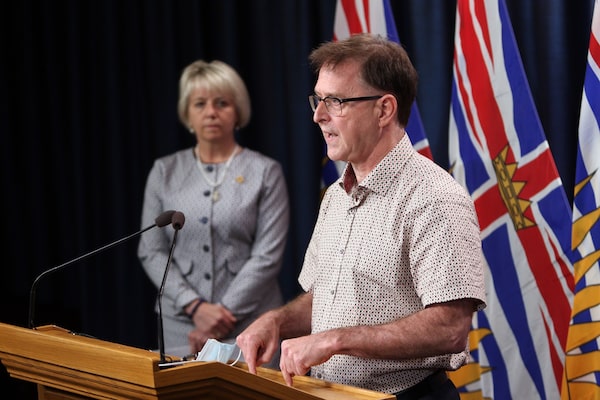
Provincial Health Officer Dr. Bonnie Henry looks on as Health Minister Adrian Dix speaks during a press conference at provincial legislature in Victoria, B.C., on August 23, 2021. THE CANADIAN PRESS/Chad HipolitoCHAD HIPOLITO/The Canadian Press
Two doctors in the B.C. village of Keremeos are out of their jobs because they have refused to be vaccinated, straining health services in the community and forcing people to leave to get emergency help, the mayor says.
“It affects the patients that are allocated to the two doctors who have decided that they walk away rather than get the vaccine,” said Manfred Bauer, mayor of the Southern Interior village.
“The major impact is right now, we actually know the emergency hours have been cut and there is no doctor on call. So people who need emergency services will have to be transferred to Penticton or any other health authority in the area.”
He added it’s also difficult for the remaining employees at the hospital who have to shoulder the extra load of work.
In a public notice Monday, the Interior Health Authority said the community’s emergency department would be open only between 8 a.m. to 4 p.m. local time. It said emergency rooms are open in nearby Penticton, Oliver and Princeton. Each are about a 45-minute drive away.
There are five doctors listed in the Yellow Pages for Keremeos.
In the region, the village is in one of the hardest hit by unvaccinated health care workers leaving their jobs as the deadline for them to be vaccinated has passed.
B.C. Health Minister Adrian Dix said Monday more than 3,000 workers across the province are now on unpaid leave, and roughly a third of them are in the province’s Interior.
He said that among 127,448 health care workers who have worked at least one shift in the past three months, 1,018 of the unvaccinated are from Interior Health. That represents about 4 per cent to 5 per cent of the work force there. It also compares with 2 per cent of workers unvaccinated in the larger health authorities of Vancouver Coastal Health, Fraser Health and Vancouver Island Health.
Meanwhile, about 4 per cent of health care workers in the Northern Health Authority are out of their jobs because of their refusal to be vaccinated.
Mr. Dix noted those numbers do not include long-term care and assisted-living staff.
“Principally, it’s been a challenge in the Interior Health Authority,” he said.
“There is some impact on lab times and responses, and in communities such as Keremeos, where a large percentage of a relatively small group of people in the facility there mean that hours are being adjusted in Keremeos.”
Kelowna General Hospital and Royal Inland Hospital in Kamloops are among those that have had to either reduce operating room capacity or postpone surgeries. Abbottsford Regional Hospital in the Fraser Health Authority has also been affected.
Provincial Health Officer Bonnie Henry said lower vaccination rates among health care workers in the Interior and in Northern B.C. reflect the vaccination situation in the overall population in some regions in the province.
In the Interior, 80 per cent of the population has received two doses of COVID-19 vaccine, compared with the province’s average of 85 per cent. In Northern Health, that number is only at 73 per cent.
“There are pockets of communities and places in communities where vaccination rates are just too low, and this virus is spreading rapidly in those communities and is causing serious illness in even younger unvaccinated people, and that’s what’s putting the strain on our hospital system in the Interior, in the North and spilling over into other parts of the province,” Dr. Henry said at a briefing.
She said health officials have been trying to reach out to each individual health care workers and answer their questions. The reasons they don’t want to be vaccinated vary, she added. “Some people are quite dogmatically against vaccination, which is unfortunate.”
In B.C., workers at long-term care and assisted living facilities must have had at least one dose by Oct. 12, and receive a second dose within 35 days of the first.
The deadline for the remaining health care workers, such as those in acute care was Oct. 26, with a second dose needed between 28 and 35 days after the first.
Dr. Henry said the pandemic has lasted for almost two years, and people, especially those in the heath care sector, should’ve understood the importance and the value of vaccination in protecting people.
“If people are in our health care system are not recognizing the importance of vaccination then that is probably not the right profession for them, to be frank.”
On Monday, B.C. reached the 90-per-cent vaccination rate for all eligible people 12 and up for their first dose. The double vaccination rate is 85.3 per cent.
We have a weekly Western Canada newsletter written by our B.C. and Alberta bureau chiefs, providing a comprehensive package of the news you need to know about the region and its place in the issues facing Canada. Sign up today.
 Xiao Xu
Xiao Xu